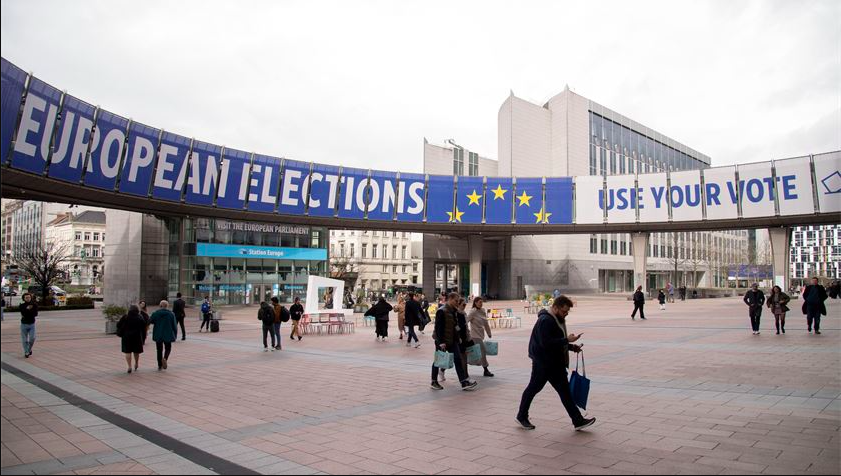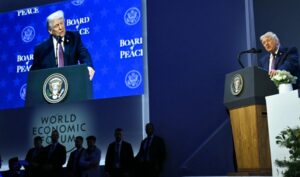
Published 06/06/2024 18:46
The elections for the European Parliament, one of the main bodies of the European Union, mobilize Europeans in relation to predominant issues in the midst of a continent that lives in the turmoil of war and economic and social difficulties. But the responsibilities of the regional integration body are not always focused on these pressing voter anxieties.
In any case, the predicted advance of the extreme right in the seats of Parliament could influence the reduction of these powers even further. Demetrius Cesário Pereira, professor of Law, Politics and International Relations (ESPM, Rio Branco and Belas Artes de São Paulo), pointed out, in an interview with Portal Redthe main topics influencing these elections and the potential impact on the European and international political scene.
Central themes of the elections
According to Pereira, it is crucial to understand that these elections are for the European Parliament, one of the key institutions of the European Union (EU). The EU, as an international organization, has specific competences, and the central themes of the elections revolve around these competences.

Firstly, he considers it essential to remember that these elections have a specific focus on EU competences, especially regional integration. “Since the 1950s, with the evolution of the European Community into the European Union, the removal of trade barriers between member countries has become a crucial issue”, commented Pereira. This complex process transformed from a simple trade area to a Customs Union and, later, a Common Market.
“So, the themes that will always mobilize voters in relation to the bloc are those that are within the bloc’s competence, since the countries that are members remain sovereign and with their national competences”, he highlights. Currently, other areas, such as the environment, health, education and work, are also on the agenda, always aiming to deepen integration between member countries.
Advancement of Eurosceptic parties
There is a notable prospect of advancement of anti-European or Eurosceptic political parties, which could represent a significant challenge for Parliament. These parties defend the reduction of the European Union’s competences, when they do not defend the rupture with the bloc itself, as happened with the United Kingdom. Such a breakthrough could drastically alter the balance of power and influence the Union’s future policies.
The prospect of advancement of these far-right parties is a worrying issue for the European Parliament. “These parties generally defend the reduction of EU competences and the devolution of powers to national states, promoting national sovereignty to the detriment of the bloc’s supranationality,” explained Pereira. The growth of these parties could represent a significant challenge to the continuity and deepening of European integration.
Migration issue
Immigration is a central theme in today’s Europe, highlighting both internal migration, facilitated by European citizenship, and external migration, which remains under greater national control. The free movement of people within the bloc and the different immigration policies of member states, such as the Schengen zone, place immigration at the center of the European political debate, especially in countries such as Italy and Greece, which are main entry points for migrants. .
“Europe, in general, has been facing significant migration challenges. Internal migration is free, thanks to European citizenship, allowing citizens of one country to live and work in another without a visa. External migration remains under national competence”, highlighted the professor. The Schengen zone’s common rules for external border controls further complicate the issue, given that not all of the Union’s 27 countries are part of this zone, while other countries (Iceland, Liechtenstein, Norway and Switzerland) do.
Left and right perspectives
Left-wing segments in European elections deeply emphasize issues of equality, proposing more uniform labor, health, and education rights among member countries. They also vigorously advocate regional funds to support less favored areas, exemplified by the Greek situation during the public debt crisis.
“The dispute between right and left is generally between freedom and equality. So, when parties on the right defend free trade, people on the left argue that this free trade must lead to equality between countries, between citizens”, he highlighted.
On the other hand, the traditional right, dominated by the European People’s Party (EPP), faces increasing difficulties in dialoguing with the electorate and maintaining its dominance in the European Parliament. “Figures like Georgia Meloni, from Italy, and the emergence of more right-wing parties indicate a decrease in the influence of the traditional center-right, despite its historical dominance,” noted Pereira. The recent victory of the Social Democrats in Germany illustrates this trend of the center-right losing influence, a legacy of Angela Merkel’s Christian Democratic Party.
Regional differences and impacts on the Ukraine war
Each European country presents specific regional demands, influenced by its own political coalitions. “Countries like Italy and Greece, immigration entry portals – Italy more in relation to Africa, Greece more in relation to the Middle East – and Eastern European nations, concerned about the war in Ukraine, have their own priorities and challenges ”, stated the professor.
The war in Ukraine, widely supported by European leaders, could change depending on the election result, with some parties advocating greater neutrality. Despite this, the general trend in the EU is support for Ukraine and opposition to Russia. “So much so that Ukraine was admitted as a candidate to join the bloc and has been negotiating this through other political parties”, he adds.
Pro-Palestinian protests and impacts for Brazil
The pro-Palestinian protests reflect a public opinion that is more in tune with the Palestinian cause, not as supportive of the Israelis. Despite this, decisions on the bloc’s foreign policy require unanimity, maintaining the sovereign power of member countries. “There is growing support for Palestine, with national recognition by important countries, but a significant change in the European Union’s position is unlikely,” explained Pereira.
The expert recalled that in recent weeks there has been recognition of the State of Palestine by important countries such as Spain, as well as Ireland and Norway, which is not a member of the European Union, and last week Slovenia. “But these recognitions were on a national basis, so there is still no unanimity. A change in the balance of forces in Parliament will hardly meet the conditions to change the European Union’s position in relation to Palestine”.
Brazil is seen as a strategic partner of the EU and the European elections could influence negotiations on the Mercosur-European Union agreement. “Although the European Parliament has the powers to ratify the agreement, national issues, especially in France, have been the main obstacles, involving agricultural protectionism and environmental concerns,” noted the professor.
Source: vermelho.org.br

